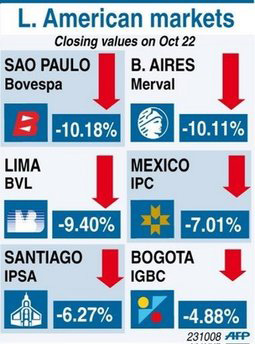
|  |  |  Business News | October 2008 Business News | October 2008  
Latin America in Jaws of Global Crisis
 Agence France-Presse Agence France-Presse
go to original


| | Closing values for key Latin American stock markets. Governments in Latin America stepped forward Thursday to calm markets left despondent by fears of a global recession and Argentina's decision to nationalize pension funds. | | |
Sao Paulo - Governments in Latin America stepped forward Thursday to calm markets left despondent by fears of a global recession and Argentina's decision to nationalize pension funds.

Brazil and Mexico took measures to try to stop the long slide of their currencies against the dollar, while an Argentine official promised the pensions grab would not mean state intervention in banks and companies managing the funds.

Those efforts, along with official reassurances that countries in the region were well-placed to come through the crisis with little more than bruises, did little to offset high volatility.

Thursday, the stock market in the region's biggest economy, Brazil, was zigzagging between a session high nearly two percent up and a low nearly five percent in the red.

The Bovespa index was 4.71 percent down with more than two hours' trading left.

Argentine shares were up 2.43 percent halfway through the day.

The day before, both bourses slid terribly, closing more than 10 percent down. Argentine bonds were also sold off en masse.

That was largely in reaction to the decision on Tuesday by Argentine President Cristina Kirchner to nationalize pension funds controlling 30 billion dollars.

Although she portrayed it as meant to protect retirees from the global crisis, analysts saw it more as a plundering of the funds to service the national debt, which stands at 150 billion dollars.

"It looks like they want to use the workers' money for non-pension spending," Gregorio Badeni, a professor at the University of Buenos Aires, told The Economist magazine.

The newspaper La Nacion quoted several lawyers as saying many of the 9.5 million clients affected were inquiring about suing the government over the move.

The head of the Spanish employers' federation, Gerardo Diaz Ferran, accused the Argentine government of "throwing us out" of the country with the decision.

An Argentine government official, speaking to AFP on condition of anonymity, said however that Kirchner was not looking to intervene in the management companies or private pension funds.

"That's not our intention, and in any case we couldn't do it from a legal point of view," he said.

A Merrill Lynch executive handling Latin American investments told AFP his bank had now written off Argentina as an investment destination "for at least the next half decade" because of the decision.

In Brazil, the woes caused by the global financial crisis has prompted further action from the government, which had been caught unprepared by the extent to which investors were also stepping back.

Wednesday, Finance Minister Guido Mantega said state-run banks were now authorized to help shore up financial institutions left vulnerable by the sudden appreciation of the dollar against the real, which has lost more than 30 percent of its value in just under a month.

Mantega stressed that Brazil's banking system was "solid" and said no bank in the country risked going under.

The measure added to central bank moves last week to allow banks to use up to 45 billion dollars of their compulsory deposits to cope with the liquidity problems on the market.

Thursday, the central bank also announced it would sell 50 billion dollars' worth of currency swaps to shore up the flagging Brazilian currency, the real.

Mexico announced a similar measure, saying it auction an extra one billion dollars Thursday to support the tumbling peso, which on Wednesday had sunk to a record low of 13.74 to the dollar.

The moves helped both currencies climb back a little against the greenback, though trends suggested the reprieve would be short-lived as investors lost appetite for emerging economies. |

 |
|  |



